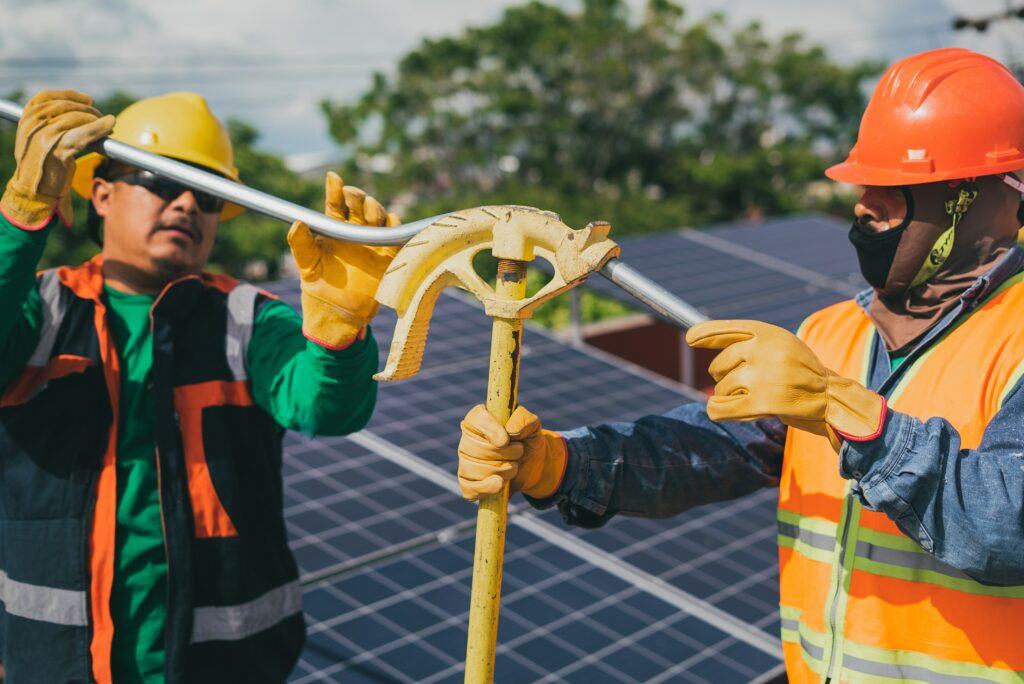News & Events
July 12, 2022
8 Different Types of Electricians and What You Should Know

Those who want to become an electrician have an array of jobs to specialize in. As a certified electrician, you can install, repair, and maintain electrical systems in homes, commercial buildings, offices, industries, and more. Here are the different types of electricians and how you can get started:
1. Residential/Domestic Electrician
Anyone interested in becoming an electrician can start as a residential electrician. It is the most common career in electricity. As a residential electrician, your job is to install, fix, and maintain electrical systems in domestic settings. You can install and repair air conditioning units, security systems, and appliances in homes. Training as a domestic electrician involves apprenticeship and formal classroom instructions.
2. Commercial Electrician
Commercial electricians have more complex roles than residential electricians. They work in bigger buildings and commercial buildings such as offices, schools, and malls. They install, maintain, and repair electrical components and complete wiring systems following necessary safety precautions. To work as a commercial electrician, you should complete your apprenticeship training in commercial setups.
3. Industrial Electrician
An industrial electrician installs and repairs electrical systems in power plants, chemical plants, factories, and mines. These industrial facilities have more sophisticated electrical equipment and need an electrician with in-depth experience. To get started, you will work under an experienced industrial electrician through an apprenticeship program.
4. Maintenance Electrician
Maintenance electricians work in residential, commercial, and industrial sectors. They review the safety of electrical systems and make sure that they are working the right way. As a maintenance electrician, you can test, troubleshoot and diagnose electrical problems. You can repair or replace electrical equipment. Maintenance electricians require a formal apprenticeship and should have an electrician license to work independently.
5. Installation Electrician
Residential, commercial, and industrial settings require installing electrical equipment and machines. You can specialize as an installation electrician and work anywhere, including buildings under construction. Your job is to install lighting, power, security, and fire alarm systems.
6. Automotive Electrician
Automotive electricians are responsible for the electrical systems in automotive vehicles. They review and install all wiring systems. Some of the areas an automotive electrician works on in a vehicle include lighting, ignition, fuel injection, anti-theft, anti-brake, heating, and air conditioning systems. To qualify as an automotive electrician, you need to understand vehicle diagnostics so you can test, troubleshoot, and diagnose problems.
7. Solar Panel Electrician
Solar panels have become a reliable alternative source of electricity. Solar panel electricians install, maintain, and repair solar panels in residential, commercial, and industrial sectors. As a solar panel technician, your task is to find ideal places to install solar panels where there is ample sunlight. You will link various panels to electrical devices through wiring.
8. Wind Turbine Electrician
Wind turbines are another alternative source of electricity. As a wind turbine electrician, your job is to assemble, maintain, repair, and replace wind turbines. You will install the wiring system and connect them to electrical devices in industrial, commercial and residential areas. Wind turbine assembling, maintenance, and repair involve climbing over 200 feet above the ground.
Stages to Become an Electrician
Apprentice Electrician
This is the initial stage you will go through to become an electrician. You will need a high school education and an apprenticeship license to work as an apprentice. Apprentices work under the supervision of journeymen or master electricians. The apprenticeship program at IEC – Independent Electrical Contractors is four years long and provides informative classroom instruction. This program is a great way to learn the job without having to do it alone.
Journeyman Electrician
To become a journeyman, you should complete your apprenticeship program. Your local or federal group will give you a test to find out if you qualify as a journeyman. After passing the test, you’ll be given a license to start working as a journeyman. All journeymen looking to work in the electricial field are required to be licensed. With your training and experience, you can start working on more complex projects without supervision.
Master Electrician
After you have worked for several years as a journeyman, you can become a master electrician. This is the most advanced stage, and most states require you to have worked as a journeyman for a few thousand hours. Master electricians take a state-approved electrician certification program and a licensing exam. After qualifying, you receive a license, meaning that you can work on the most complex projects. As a master electrician, you have enough experience to train and supervise apprentices and journeymen.
If you are looking for a job as an electrician, IEC – Independent Electrical Contractors offers training like our apprenticeship program to help those interested in starting down this career path. With the above different types of electricians, you can specialize and rest assured to venture into a lucrative career. Get started on your electrician career today.